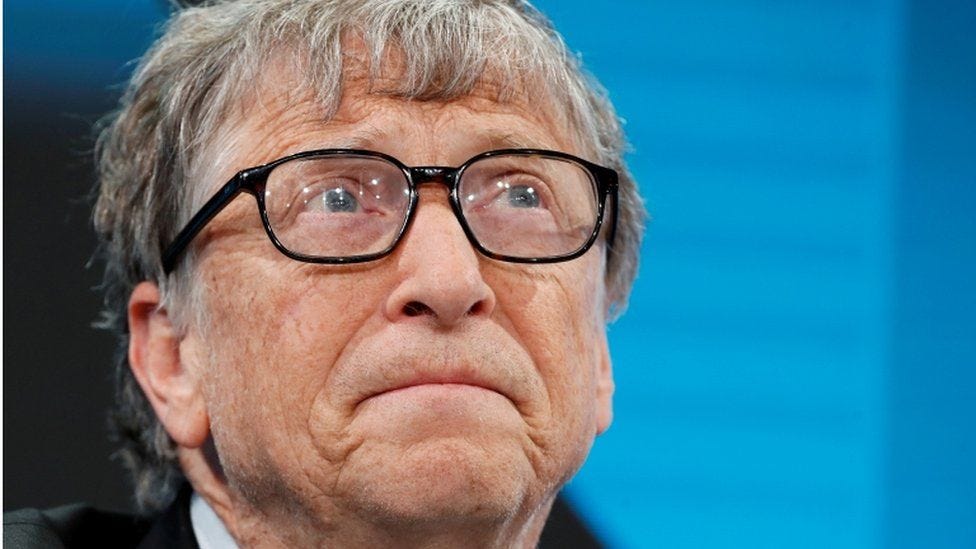Bill Gates: AI Will Replace Teachers
His prophecy must be called what it is: a horror disguised as progress, the crowning insult of a technocratic age that dreams of perfect control but births only deeper alienation.
Let it be duly noted that when Bill Gates, the soft-spoken Maharaja of Menlo Park Malthusianism, opens his mouth these days to make a prediction, like some second-rate Delphi oracle with a Wi-Fi connection, it would be wise for all good citizens to stop, to turn off the ambient Spotify drone, to tuck the children away into soundproof basements, and to take up arms, metaphorically of course. His latest pronouncement, delivered with the dispassionate chirp of someone who long ago forgot how to distinguish a man from a mainframe, is that within a decade AI will replace all human teachers.
One can almost hear the TED Talk laughter, the clinking of biotech champagne glasses, the low murmur of venture capitalists murmuring ‘inevitable’ into each other’s ears like demons trading war tips in Hell.
If Bill Gates knew anything about the human person, he might have paused, mid-blink behind his designer frames, to consider that education is not, has never been, and never shall be a function of mere information transfer. To teach is not to upload, or to update, or to patch the firmware of the human mind. It is a communion — flawed, unpredictable, chaotic, luminous.
But Gates, prophet of pixel and profit, does not traffic in souls. He traffics in metrics. In graphs. In Key Performance Indicators. His imagination, marinated in decades of strip-mall futurism, can only conceive of the student as an unfinished hard drive, and the teacher as an inefficient, glitchy upload cable. Replace the cable, he says, and watch the data flow.
How did we arrive at this shriveled concept of man? Perhaps, in the antiseptic offices of the Gates Foundation, one finds a Platonic ideal of the student: sexless, voiceless, witless, a perfect consumer of content, mouth agape, eyes glazed. No awkward questions about justice or beauty, no sudden bursts of laughter, no unexpected tears, no wild surges of human will, just the steady, sterile absorption of “content” until death or obsolescence.
In the world of Gates, there is no Socrates. No Dantes, no Sapphos, no Shakespeares. Only software updates. No curriculum of wonder, only a black parade of “learning objectives” checked off by neural nets too busy churning out rubrics to notice that a child's soul is not a server farm.
The human person is not a CPU. The mind is not a cloud storage unit. The soul—and oh, what a dirty word for the silicon evangelists!—is not optimized by efficiency but wounded into greatness, taught by the slow, painful, beautiful business of encountering another human being who dares to demand more, who calls us beyond ourselves. The teacher is not merely a deliverer of ‘content’ but a mirror, a provocateur, a midwife of the spirit.
Ten years, he says? Perhaps less, if the great work of dehumanization proceeds apace, if we continue to trade faces for avatars, dialogues for dopamine hits, teachers for automata.
Can ChatGPT weep with a student betrayed by the world? Can an LLM offer a glance of silent solidarity when a boy discovers, for the first time, that Plato’s “Allegory of the Cave” is about him? Can AI correct without humiliating, inspire without flattering, rebuke without crushing?
Gates, one suspects, has long ago lost the ability to imagine such things. He moves now through a world of synthetic approximations, where virtue is an “algorithmic outcome” and friendship a “social network connection.” To him, the flaws of teachers—their anger, their boredom, their unscientific hunches—are bugs in the system, rather than the very cracks through which the light gets in.
And so his prophecy must be called what it is: a horror disguised as progress, the crowning insult of a technocratic age that dreams of perfect control but births only deeper alienation. Ten years, he says? Perhaps less, if the great work of dehumanization proceeds apace, if we continue to trade faces for avatars, dialogues for dopamine hits, teachers for automata.
But not if we resist. Not if we remember that the true education, the only education worth the name, is not a product, not a service, not a file to be downloaded, but a dangerous, glorious, messy encounter between two immortal beings, frail and stubborn and half-blind, reaching out toward truth like condemned prisoners tunneling through a prison wall with their bare hands.
That, dear Mr. Gates, is something no machine will ever understand.
Michael S. Rose, a leader in the classical education movement, is author of The Art of Being Human, Ugly As Sin and other books. His articles have appeared in dozens of publications including The Wall Street Journal, Epoch Times, New York Newsday, National Review, and The Dallas Morning News.




Yet, Gates is the canary in the coal mine. I have been reading AI essays in order to evaluate its ability. Vacuous. The smell of deathly decay.
Poor Bill Gates struggles to find himself relevant and interesting. I can imagine myself sitting down for a beer with Elon Musk or even with Jeff Bezos. I cannot imagine how insufferable it would be to have to spend even a few minutes with Gates. His money can buy him attention; understanding, compassion, empathy and all of the things that differentiate us from robots and mainframes are priceless, and can never be bought except through experience and personal effort. I suspect that 100 years from now Gates will not even merit a footnote in history books.